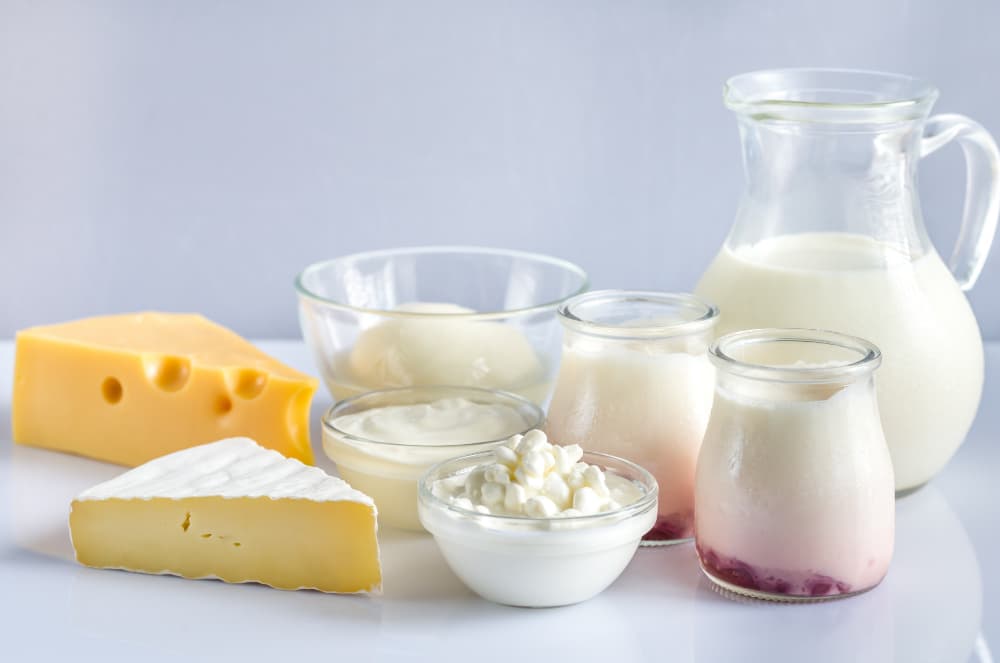Many people are questioning whether they should have any dairy in their diet, or avoid dairy altogether. Do you need to “ditch the dairy” to be healthy? Dr Budwig was in favor of a limited amount of dairy. Furthermore, her famous flaxseed oil and dairy recipe has helped countless people with all types of cancer.
So, as the saying goes, “It’s hard to argue with success!” That’s why we implement the Budwig Diet in our programs. If you would like to know more about the Budwig Diet or other natural health treatments, contact us on +34 952 577 369.
The Lancet, on Sept 11, 2018, published a study, which was based on food questionnaires from more than 136,000 people from 21 countries. A follow-up was done that lasted an average of nine years. Researchers found that adults who consumed two or more servings of dairy each day had a 22% lower risk for heart disease, a 34% lower risk for stroke, and a 23% lower risk of heart-related death.
Milk contains vitamins and minerals which are essential for the health of your cardiovascular system. Calcium and the fat-soluble vitamins found in milk and other dairy products have numerous protective effects against atherosclerosis.
Dairy Improves Bone Density
In addition, studies indicate that dairy improves bone density, reduces the risk of developing osteoporosis, and lowers older adults’ risk of fractures. This is a major problem as people age.
Have you heard of “coronary artery calcification”? This refers to the buildup of calcium in the blood vessels around the heart. To control calcium buildup, you actually need adequate calcium, low phosphate, and adequate fat-soluble vitamins. All of these requirements are covered by consuming dairy. In fact, dairy products are rich in calcium, protein, potassium, and phosphorus.
Fermented dairy products like yogurt and kefir are produced by increasing the acidity of milk by adding beneficial bacteria, which is good for your gut. The primary role of lactose in milk is to provide energy. It also has a potential prebiotic effect, meaning it promotes the growth of your gut’s friendly bacteria, leaving you with a healthier community of bacteria.
If you can find “grass-fed” dairy products, it is the best choice. Grass-fed cows raised on pasture may have up to 92% more omega-3 fatty acids and 94% more conjugated linoleic acid (CLA) than milk from conventionally raised cows. This way you don’t have to totally avoid dairy.
What is the Best Dairy to Consume?
You may find sheep or goat dairy (milk and cheese) easier to digest and freer from antibiotics. Most civilizations in the past consumed sheep and goat dairy products. Dairy from grass feed cows is also another option, but not always available.
If you are lactose intolerant, that is usually an indication of too much “Candida” in your gut. Stopping all dairy and taking Diatomaceous earth (food grade) for 30 days usually corrects that problem.
Low-fat dairy does not offer as many benefits as dairy with some fat content. The famous Dr. Budwig flaxseed and dairy mixture uses Cottage cheese or Quark with 2% fat content. If 2% is not available, use a lower fat content; however, there is more nutrition in dairy with some fat content.
Cancer Feeds on Methionine
If you have cancer, it would not be recommended that you consume any additional dairy except what is in the Dr. Budwig flaxseed and dairy recipe. Animal protein contains a lot of “methionine,” which is an amino acid that cancer feeds upon.
Methionine is an amino acid found in most foods, even fruits and vegetables, however they are found in great amounts in animal protein. The main concern of consuming dairy when you have cancer is the Methionine, which is an amino acid that cancer uses as food. To help “block” this amino acid, we recommend our clients consume 2 capsules of Glycine daily between meals.
Do You Have to Avoid Dairy?
So, it is best to limit foods that are high in methionine. Meat is very high in methionine, and dairy has only moderate amounts; however, it is best to limit this amino acid when dealing with cancer.
If you are not able for the moment to consume dairy for calcium intake or need to avoid dairy, non-dairy sources of calcium include kale, leafy greens, legumes, and calcium supplements.
For more information on our programs, contact us.
